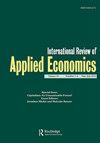The role of agency and regulation in economic and social processes
IF 1.6
Q3 ECONOMICS
引用次数: 0
Abstract
This issue of the International Review of Applied Economics contains several papers which explore the way in which the participation of people – as citizens and employees – can and does impact economic and social life, along with the role of regulation. In ‘The heterogeneity of residents’ preference over a wide array of services, provided by a master planned community’, James Yoo and Julianna Browning report on the preferences of residents for various amenities within their neighbourhoods, and on how these may vary between different sections of the community. In ‘The quotas law for people with disabilities in Brazil: is it a guarantee of employment?’, Ana Cléssia Pereira Lima de Araújo, Maria Analice D. Santos Sampaio, Edward Martins Costa, Ahmad Saeed Khan, Guilherme Irffi and Rayssa Alexandre Costa find that by 2016, the effects of establishing legal employment quotas for people with disabilities in Brazil were positive for firms employing between 100 and 500 workers. This demonstrates the importance of such regulatory activity, although in practice the effect across countries over time will depend on the action of people actually enforcing the regulations – including both the regulatory authorities themselves, which requires that they be adequately resourced, and employees, often through trade union involvement.机构和监管在经济和社会进程中的作用
本期《国际应用经济学评论》包含了几篇论文,探讨了人们作为公民和雇员的参与能够而且确实影响经济和社会生活的方式,以及监管的作用。James Yoo和Julianna Browning在《居民对总体规划社区提供的各种服务的偏好的异质性》一书中报告了居民对其社区内各种便利设施的偏好,以及这些偏好在社区不同部分之间的差异。在“巴西残疾人配额法:这是就业的保障吗?”中,Ana Cléssia Pereira Lima de Araújo、Maria Analice D.Santos Sampaio、Edward Martins Costa、Ahmad Saeed Khan、Guilherme Irffini和Rayssa Alexandre Costa发现,到2016年,为巴西残疾人建立合法就业配额的效果对雇佣100至500名工人的公司是积极的。这表明了此类监管活动的重要性,尽管在实践中,随着时间的推移,各国的效果将取决于实际执行监管的人的行动——包括要求他们有足够资源的监管机构本身,以及通常通过工会参与的员工。
本文章由计算机程序翻译,如有差异,请以英文原文为准。
求助全文
约1分钟内获得全文
求助全文
来源期刊

International Review of Applied Economics
ECONOMICS-
CiteScore
4.30
自引率
4.50%
发文量
37
期刊介绍:
International Review of Applied Economics is devoted to the practical applications of economic ideas. Applied economics is widely interpreted to embrace empirical work and the application of economics to the evaluation and development of economic policies. The interaction between empirical work and economic policy is an important feature of the journal. The Journal is peer reviewed and international in scope. Articles that draw lessons from the experience of one country for the benefit of others, or that seek to make cross-country comparisons are particularly welcomed. Contributions which discuss policy issues from theoretical positions neglected in other journals are also encouraged.
 求助内容:
求助内容: 应助结果提醒方式:
应助结果提醒方式:


